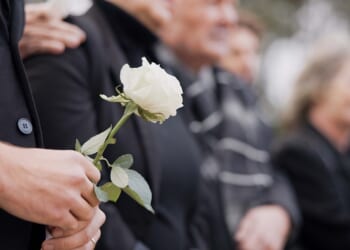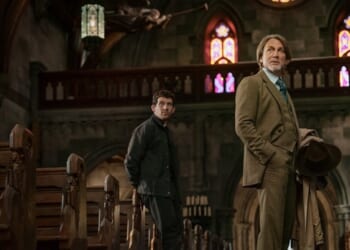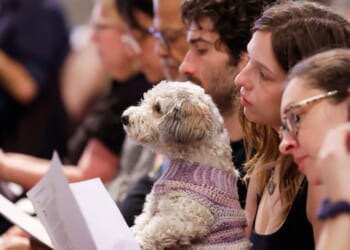Sense of perspective
I HAVE just joined the Mile High Club. Readers with dirty minds might be surprised at this confession, but I am referring to my visit to Denver in Colorado, a city that lies one mile above sea level. Founded in 1858 during Pike’s Peak Gold Rush, it is a vibrant and free-spirited city, with a similar population to that of Manchester, but boasting 300 days of sunshine a year, more than 250 parks with views of the Rocky Mountains, and an impressive 150 breweries.
I was there at the kind invitation of the Episcopalian Cathedral of St John in the Wilderness. I have never been made more welcome. I gave talks and sermons, attended various events, and discovered a large community of fun and faithful people whose discipleship gives them a questioning and infectious joy.
They reminded me of how I believe in the separation of Church and Hate; and of how reassured I feel when Christians refuse to imitate the cruelties of the malevolent group hate that flourishes with such paralysing intent in today’s “social” media and political life.
Eyes to see
DENVER’s Art Museum — one of the largest in the United States — currently has a wonderful exhibition of Camille Pissarro’s paintings. The “Father of Impressionism” was born in what are now known as the Virgin Islands, but he developed the style of painting which we recognise as distinctively his after his move to France.
Among the exhibition’s display of lush green gardens, busy Parisian bridges, and fiery sunsets, it was strange suddenly to see paintings of a train in Dulwich and St Anne’s, Kew. During the Franco-Prussian War, Pissarro fled to England for a while.
I left the gallery with the usual mix of excitement and resolve to attend better to a world that calls out to us with such longing to be seen and known — and grateful for Pissarro’s insight that “Blessed are they who see beautiful things in humble places where other people see nothing.”
Signs of the times
WALKING around Denver’s residential neighbourhoods, I saw, propped up against houses, placards that had been used at the recent “No Kings” protests against President Trump. One read, “I have three kids — I know when someone is lying to me.” “Things are so bad,” said another, “even the introverts are here.” And one was ferociously embroidered: “I am so angry, I stitched this just so I could stab something 3,000 times.”
Events were more riotous in Alabama, where, during a similar protest, a woman wearing a giant inflatable phallus costume was arrested by police. She was holding a sign that read “No Dick-tator” and was wrestled to the ground by three cops for disorderly behaviour. Presumably she was taken to the penistentiary.
The book of life
BACK in England, it was a beautifully crisp autumnal day as I made my way to the Gloucestershire home of Dame Jilly Cooper, who had died after a fall. With her family, I said a prayer alongside her body as it lay in her writing room, before officiating at her funeral and burial.
I had first met her at a friend’s wedding, at which she had decided to try to get the vicar drunk. She did quite a good job, and we quickly came to see that we enjoyed each other’s humour. She would have loved the Alabama costume.
She was a woman who understood human privacies and intimacy, and who meticulously researched everything she wrote, because she loved life and all its twists and surprises. The world was her book, and she read it with a loving and curious attention.
She was a skilled stylist and satirist; a person who read widely and deeply, but wore it lightly. She was witty, compassionate, and hugely generous. Any time spent with her brought both comfort and excitement. Her close friend Queen Camilla hoped that her “hereafter [would] be filled with impossibly handsome men and devoted dogs”.
As the golden leaves danced in the wind beneath a bright blue sky, and small glasses of her sloe gin were raised with thanksgiving at her graveside after the committal, I read the hopeful words of Donne: ‘‘In heaven it is always Autumn; His mercies are ever in their maturity.”
A pair of queens
SOUTHWARK CATHEDRAL also suffered a loss in the death of a faithful member of the congregation, Prunella Scales. She attended regularly with her husband, Tim West, who died last year. Her faith was important to her. When she was a guest on Desert Island Discs, she asked for a Bible in Russian as well as for the complete works of Shakespeare in German.
She was the first person to portray a fictionalised Queen Elizabeth II on the British stage. Theatres had shied away from plays featuring a living monarch but, the critics said, in Alan Bennett’s A Question of Attribution, Pru captured the Queen’s “essence” and “enigma”, as well as her mannerisms and voice.
In 1992, she was appointed CBE. At the investiture, as the Queen pinned on her insignia, she said to Pru: “I suppose you think you should be doing this.”
Ever loving memory
IT WAS, of course, as Sybil in the dysfunctional Torquay hotel Fawlty Towers that many will remember Pru Scales. Her shrill, warpath shouts at her husband, Basil, her high coiffured hair, and her braying laugh (which Basil likened to “someone machine-gunning a seal”) were all part of my childhood. It was, though, in the many series of Great Canal Journeys that I will always recall her.
Ingrid Bergman used to say that getting old is like climbing a mountain: you get a little out of breath, but the view is much better. In later life, and diagnosed with vascular dementia, Pru bravely joined her husband on Britain’s waterways for that better view. Their tender, pure, and distilled happiness together was very touching to watch. “She can’t remember things very well,” West said, “but you don’t have to remember things on the canal. You can just enjoy things as they happen — so it’s perfect for her.”
In the words of her beloved Shakespeare, Pru laid aside “life-harming heaviness” to entertain “a cheerful disposition”. May she rest in love.
Double negative
RECENTLY, I had the honour of sharing a meal with Lady Hale, aka Spider Woman. I am now reading her latest book, With the Law on Our Side: How the law works for everyone and how we can make it work better. It is a citizen’s guide to the law in our land, reminding us all why we should care about it.
I think Christians should be renewing our courage to proclaim that no one is above the law — and no one is below it, either. As Bonhoeffer said, “Not to speak is to speak. Not to act is to act.”
The Very Revd Dr Mark Oakley is the Dean of Southwark, and Whitelands Professorial Fellow at Roehampton University.

















